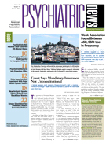On January 1, 2009, Medicare began its Electronic Prescribing (e-prescribing, or eRx) Incentive Program (see Psychiatric Practice and Managed Care in the October 15, 2010, issue for a description of the program). Eligible physicians who have not availed themselves of the program, which offers a 2 percent incentive for the use of e-prescribing, may now be facing a penalty in 2012—Medicare calls it a "payment adjustment"—rather than an incentive.
The way the regulations stand is that if an eligible physician (a physician who is part of the Medicare program) who had 100 or more Medicare encounters using one of the CPT codes listed in the denominator (see below for a list of these codes that psychiatrists would be likely to use) fails to use e-prescribing at least 10 times between January 1 and June 30, the physician will be penalized 1 percent on all Medicare claims filed in 2012 (1.5 percent in 2013). Originally, the penalty was to begin on January 1, 2012, unless the physician had applied for a hardship exemption by June 30. However, on May 26, the Centers for Medicare and Medicaid Services (CMS) issued a proposed rule to extend the hardship-exemption deadline to October 1 and increase the types of hardships that merit an exemption.
These are the only hardships that now allow a a Medicare provider to avoid the 1 percent penalty:
If the physician practices in a rural area that lacks sufficient high speed Internet acess
If the physician practices in an area that doesn't have sufficient pharmacies for electronic prescribing
If the new rule goes into effect, the following exemptions will be added:
If the physician had limited prescribing activity during the first six months of 2011.
If the physician delayed purchasing an e-prescribing system because of the intention to participate in Medicare's electronic medical records incentive for 2011.
If the physician lives in an area where regulations prevent e-prescribing such as those prohibiting paperless orders for narcotics.
If the physician e-prescribes but only for types of visits that don't count toward the 10-order minimum.
The proposed rule is expected to go into effect before the October 1 deadline. CMS will be providing information on how to file for an exemption, and that information will be posted on APA's Web site, <
www.psych.org>. Also, look for more information in a future issue.
Denominator Codes: 90801, 90802, 90804, 90805, 90806, 90807, 90808, 90809, 90862, 99201, 99203, 99204, 99205, 99211, 99212, 99213, 99214, 99215, 99304, 99305, 99306, 99307, 99308, 99309, 99310, 99315, 99316, 99324, 99325, 99326, 99327, 99328, 99334, 99335, 99336, 99337, 99341, 99342, 99343, 99345, 99347, 99348, 99349, 99350
